|
Charlotte Young Collection (1878-1985)
- Series 4 |
| M80.4.1 Notebooks of Charlotte Young, Folders 7-8: |
| Source |
Series |
Folder |
Description |
Thumbnail |
| M80.4.3 |
Notebooks |
7 |
Notebook of class notes taken by Charlotte Young [1 item] |

 |
| M80.4.3 |
Notebooks |
7 |
Presbyterianism In Ireland
The history of Presbyterianism in Ireland dates from the Ulster- plantation
under James I. Most of Ulster had been confiscated by the crown, thither
emigrated a large number of Scotch Presbyterians. At first they received
special consideration by the [government], but this policy was reversed
while William Land was bishop of Canterbury. The independent life of
Presbyterianism in Scotland began with the formation of Presbytery of Ulster
in 1642. Was checked for a time after the restoration of the Stuarts in
1660. Late 17th and early 18th [centuries], Unitarian tendencies caused
dissensions- now fine Presbyterian bodies in Ireland. |
 |
| M80.4.3 |
Notebooks |
7 |
Scottish Church History
Background for Story of Mrs. John Erskin
In Scotland
In 1560 a Confer. of Faith which Knox drew up, was sanctioned by the Scotch
Parliament which also ratified the jurisdiction exercised by the General
Assembly of the Pres. Ch. This the beginning of the Kirk, or the Scotch
Establishment. There have been many divisions among the [President] of
[Scotland], but today nearly all the elements of Presbyterianism in that
country have been collected into 2 great churches: The Established Church
and the United Free Church.
Established Church of Scotland may be said to date from August 1560,at which
time the Scottish Parliament without any writ from |
 |
| M80.4.3 |
Notebooks |
7 |
the sovereign, assembled at Edinburgh, decided that the
Protestant Confession of Faith (drawn up in much the same lines as the
Confessions of Westminster) should henceforth be the established, and only
authorized, creed of the Scottish Kingdom. The same parliament abolished
papal jurisdiction, and forbade the the celebration or hearing of Mass under
penalty of death. But it made no provision for the appointment of the new
clergy, or for their maintenance.
Free Church of Scotland (known since 1900 as United Free Church) included
in 1908 more |
 |
| M80.4.3 |
Notebooks |
7 |
than 500,000 Presbyterians.
Dates from 1843.
"Ten Years Conflict"- 1824-1834 ended in Veto Act. |
 |
| M80.4.3 |
Notebooks |
7 |
At Mrs. V.F. (Mrs. Jessie Burgin) Hemphill's is a painting
of her grandmother, Harriot (Davidson) Burgin. The painting is evidently by
a great painter. It represents the lady, who was probably about 30 years of
age, wearing a lace cap trimmed with pink silk ribbon, a dainty bow of it on
the left side of the cap, just along the ear, and a dainty bow of it under
the chin, just to the left; a collar of the same sheer lace, having
inversion and a lace ruffle.
The lady looks sick of the frame with an expression of the eyes strangely
wise and non-committal; about the lips a smile as cryptic and elusive as
that of the Mona Lisa.
Mrs. H. remembers hearing it said that the painting cost $75. |
 |
| M80.4.3 |
Notebooks |
7 |
Jan. 15
Lies buried in the Presbyterian Church Cemetery on Swannanoa. Said to be
daughter of Col. Davidson. She was sister of Col. William Davidson. Mrs.
Hemphill loved this old great uncle, Col. William Davidson, whom she, as a
child, used to see read without glasses- with his second sight. He was a
brother to this grandmother of Mrs. Hemphill's. |
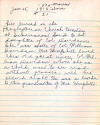 |
| M80.4.3 |
Notebooks |
7 |
Interview with Mr. Luke
Geronimo was captured by Capt. A. W. Budd and Gen. Miles and Gen. Crook. Mr.
[Luke] was under Gen. Miles when [Geronimo] was captured at Skeleton Canyon in New
Mexico Territory in 1886. Brought him in to Ft. Bouro, then took him to
Florida, near St. Augustine and left him, where he stayed around 20 years.
Then he was taken by soldiers to "The Indian Territory." G. and (followers
left the Apache reservation in Arizona, near where the Big Horn now is) about
1886, harassed settlers and did damage. Soldiers followed him into Old
Mexico and back again. Soldiers were 14 months in the field after him.
Finally he surrendered, rather than was captured. Was escorted up from |
 |
| M80.4.3 |
Notebooks |
7 |
Casa Grande. Was surrounded in Skeleton Canyon. 4 Cavalry
troops B.C. G and F., with Cap. Budd of G Troop, Cap. Lawton (then Gen.) of
B, and Cap. Thomson of G., and Cap. Davis of F. Parts of B and C troop
escorted him to Fla. All troops were of 4 Cavalry.
Victoria, predecessor of Geronimo, gave trouble to the government and was
skilled in the same place where G. was captured, Skeleton Canyon. Apaches
quiet then until outbreak of 1885 under G. |
 |
| M80.4.3 |
Notebooks |
7 |
Mrs. James Luke, belongs to Indian War Veterans.
Only two such in the state, the other in the eastern section.
Has 3 war medals (Have to go through almost a Civil Service exam for it)
1 Indian War Medal
1 Army and Navy Union Badge
1 Indian War Veterans BadgeWent more than 300 miles down into Old Mexico
to Sierra Madras. Had several skirmishes with the Indians. Last quite a
number of men. |
 |
| M80.4.3 |
Notebooks |
7 |
Has scalping knife which he took off an Indian. |
 |
| M80.4.3 |
Notebooks |
7 |
Incident of the Apache Kid
Gen. Miles at breakfastTold also by Gen. Gorge Harris to Mrs. Cole while
she was nursing him at Battery Park Hotel, on his return from Cuba, where he
was Col. of the Rough Riders, a great friend of Roosevelt. Pershing was
under him in Cuba.
Mr. Luke followed G. into Sierra Madras.
Capt. Crawford, of 3rd Cavalry, had a detail of 2 or 3 companies of Indian
Scouts- Navajos- Was killed by Mexicans, who thought that he and his scouts
were enemies. Was buried. |
 |
| M80.4.3 |
Notebooks |
7 |
Troop C., 4 Cav., had permanent camps at Lang's Ranch, on
Mexican New Mexican and Arizonian line. Detail of 20 went with undertaker to
bring Capt. Crawford's body to U.S. Left camp early Feb., didn't get
back till March 17. Nearly six weeks on trip- put body in rubber sack, put
riches in crate, and brought it on pack mules. Guadeloupe Canyon with a
wagon, had to take wagon apart, pack pieces on backs of mules to get it out
of the canyon. Once one of their cavalries was coming into FN. Bouy, Mr.
Grover- another man coming with him to get discharged. Latler, who had only
a few days to survive, killed by Indians |
 |
| M80.4.3 |
Notebooks |
7 |
at Cowboy pass. Had a skirmish with Indians. Tripper's
Battleground, place where Victorio had before given battle, lost 8 men in
skirmish.
Another place where they lost men was Guadeloupe Canyon. A detail of men
left there- 10 altogether- all wiped out but one man.
(Lieut. Galewood, who brought G. up for powwow with Gen. Miles, has
written book on this war. Could speak Apache, Also a book by Burke)
Mr. Luke says he has never met up with any of the men who served with him
since war |
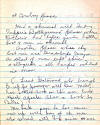 |
| M80.4.3 |
Notebooks |
7 |
Mr. L says Gen. Crook never told a lie to an Indian. Tells
of powwow outside of Nogallous. He told Geronimo if he came into the
reservation and behaved self, everything would be forgiven. If not, they'd
have to fight, and he would wipe the tribe out. All the soldiers almost
worshiped Gen. Crook. Miles altogether different in character. He believed a
lie didn't hurt anything. At same time a good officer, though. All soldiers
sorry to see Crook blame that department. Guess it broke his heart in the
end, for he lived only a short time after this.
"We often said the Lord's Prayer backward for Geronimo, and don't you forget
it. For, many a time |
 |
| M80.4.3 |
Notebooks |
7 |
only 4-6 would return out of 24 cavalry.
Often had courier duty. Lucky to get detail of 20 miles, so as to return to
camp same day. Sometimes 50 miles or more, a two day's journey. Sometimes,
when courier returned, camp had moved, with 10 or 12 hours short of courier. Had
to go look for company. Only emergency rations carried was a piece of "gert"
(sundried) beef on back of saddle. Jerk down saddle, take "gert" beef,
scrape mud dried sand from it, before eating it.When war was over, officer
told all to put on blouses and get in order. Not a whole blouse in regiment.
Men had not shaved in 14 months. No provisions for razors and soap. "A set
of ragamuffins." |
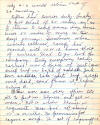 |
| M80.4.3 |
Notebooks |
7 |
To cook, need to dig trench in ground, someone detailed to
get firewood- muskite wood, only thing on prairie. Light fire in trench, put
cooking utensils, into it, break bread one pan over other like Dutch oven,
leave it to cook that way. Lucky to even get water. When found, "Horses
find." Good to horses. (Gen. George Harries (a lord in Wales) still living
in west) Place in debt, exchanged it for a place in Canada. Joined army.)
Mr. L. says didn't see that gov. had made mistake. "We young fellows didn't
have any sense." See now that gov. made mistake. |
 |
| M80.4.3 |
Notebooks |
7 |
Harris astonished to see Randolph of the citizen, Mrs. Cole
reports) Bunch of Prisoners of FN. Bouy
About 20 women (squaws) and 20 or babies (papooses). In that lot an old
squaw, about 80 years of age, actually not an Indian at all. Had been
captured years ago when a child down in Mexico used to call her Mio. Murphy.
She was the grandmother of the whole bunch. They were taken to Florida,
prisoners of war, along with others.
Miles had a breakfast for the ladies of the persh, said Gen. Harris. I was
there. "The |
 |
| M80.4.3 |
Notebooks |
7 |
Gen. Chaffer
Pershing, 2 Lieu. in Apache was never a Maj., Col., or Leut-Col
Jumped over these.
Called "black Jack"
Used to teach negros- couldn't get a white school. Was a poor boy. Made his
own trunk. Expressman banged up trunk. Pershing thrashed expressman. Next
year expressman whipped man he thought was Pershing, Dr. Halloway, an
osteopath in Dallas, later. Then Pershing came around corner and whipped
exressman again, at a little town in Missouri. Pershing helped Harries in
Spanish War, with colored regiment. |
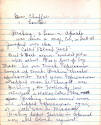 |
| M80.4.3 |
Notebooks |
7 |
Pershing's enlisted men were his former pupils which he had
taught. |
 |
| M80.4.3 |
Notebooks |
7 |
Great grandfather a French nobleman- threw it up for
Protestantism.
Great Grandfather Pettigrew opposed to his daughter's marriage to Cameron.
She was married in Trun Church, Glasgow. Wedding feast held at the brides
grandmother Anderson's. Bride brought her little hamper of clothes (sneaked
them out) to her grandmother. The grandmother took clothes out and filled it
with eatables. Young people formed a procession with young couple, left them
at door of little furnished cottage. No clothes when bedtime came (1822).
Had only her gray silk dress, low bodice short waste, short sleeves. |
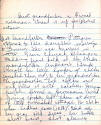 |
| M80.4.3 |
Notebooks |
7 |
4 breadths in skirt. Groom divided his night cap with her.
Earned money to buy them by weaving Turkish veils. She was a harness-loom
weaver, that is she put silk embroideries in the Turkish veils.Catherine
Pettigrew, who married Duncan Cameron
Hadn't enough pots and pans; went to buy them, found best man and another
man who said they'd carry the things home. Delayed coming. Couple retired.
About 12 midnight a terrible knocking. Boys came in, a pot full of whisky,
brought |
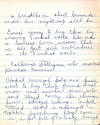 |
| M80.4.3 |
Notebooks |
7 |
bread, a quarter of cheese, made groom sing ballad songs-
all sang and feasted till morning.
Lowland, lassie, wilt tho go,
Where the hills are clad with snow
Where beside icy sleep
The highland shepherd tends his sheep
No ill nor care can thee, betide
When rolled within my highland plaid.
Lowland |
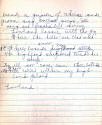 |
| M80.4.3 |
Notebooks |
7 |
Heard a patient Mrs. McKensie sing in 45 years ago Dr.
Frith's way of piling up salts, sienna, etc on broom paper over the counter.
Open shed where milk was sold along with old clothes, goats
Hay's open Polar Sea Expedition . Did all sorts of "crazy stunts,"
mischievous. These men weren't to find Franklin who was searching for
Northwest Passage.
Played "Follow the Leader," hopped into big open tankards of milk- holiday
milk for 40 lbs butter.
|
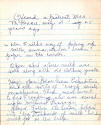 |
| M80.4.3 |
Notebooks |
7 |
Brought chambers, striped blue and yellow, ate buns and
porter out of them (in Making beer, malt cheese allowed to burn. Peter made
from this)
(Marshall Neiz's grandchildren were brought up in the Bucken Orphanage
Dallas, Texas about 7 miles distance from Dallas) |
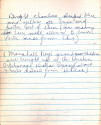 |
| M80.4.3 |
Notebooks |
7 |
Catherine Adain Luke (Cole) named for her son of the Bishop
(Episcopal) Fernit and Ossory. The Pettigrerisand Andersons got mad at him
because he joined the Episcopals, an uncle of her grandmother hence Robin a
first cousin of her grandmother. "Robin," a Larson-seorum fellow, having
some kind of government job.
1846 grandmother Cameron left widow. |
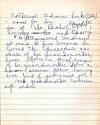 |
| M80.4.3 |
Notebooks |
7 |
Songs of the 60's
Ring, Ring the Bells
Swing at the Centennial
1776. (Mrs. Cole taught this in the infant school in Ireland, 1777.) |
 |
| M80.4.3 |
Notebooks |
7 |
Old Long Island's Sea-girt Shore. (By the author of Ben
Bolt)
(Mrs. Cole's old nurse, Elena Hurley, used to sing her to sleep with Ben Ben
Bolt) (Sung by her at parties)
On Old Long Island's
Sea-girt shore,
Many an hour I've whiled away
Listening to the breakers roar
That washed the beach at RockawayTransfixed I've stood while
nature's lyre
In one harmonious rapture woke
To watch young Iris as she dips
Her mantle in the sparkling dew |
 |
| M80.4.3 |
Notebooks |
7 |
Till chased by Sol, away
she skips
O'er the horizons glimmering blue |
 |
| M80.4.3 |
Notebooks |
7 |
Lowland lassie, wilt thou go
Where the hills are clad writ snow
Where beside the icy steep
The highland shepherd tends his sheep
No ill, no care, can thee betide
When rolled within my highland plaid
Lowland lads my dress more fine
Oo in words more saft than mine;
Lowland lads have more of art
All my boast, an honest heart
No ill, no care can the thee betide
Across the lake, how swift they glide
Young Donald and his lowland bride
|
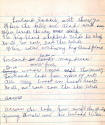 |
| M80.4.3 |
Notebooks |
7 |
Jerome Counihan of Limerick
Inventor of limericks
Ed. of Munster News
Munster the 6th of S.W. CountiesMrs. C graduated 4 years' cruse
Brooklyn Homeopathic
No Cumberland Sr. Hospital
Included 2 years of work of physicians,
Graduates of College for Physicians and surgeons of New York City
June, 1884, came to America |
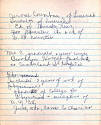 |
| M80.4.3 |
Notebooks |
7 |
1832 Mrs. C's grandmother went in a steamer from the Clyde
to Cork. Put into Belfast Locke during a storm in 2 weeks after it left
Clyde, it reached Dublin. Saw poor people selling Turf to burn. Another
storm, sail into Consail, then to Cork. Three weeks from Glasgow to Cork
Husband came by mail coach to see why she didn't come back. She was in Cork
at St. Finnbar's Cathedral (a house belonging to). Told husband to like her
away from a house where they sang such ribald songs. (Some Methodists were
staying there and singing a religious song to the tune of Jockey at the
Fair) |
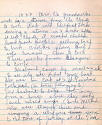 |
| M80.4.3 |
Notebooks |
7 |
Here we suffer grief and pain
He we meet the part again
In heaven we part no more
O, that will be joyful, joyful
O, that will be joyful when we meet to part no more
Parents, teachers will be there
Who have sought the Lord by prayer
From every sabbath school
O, that will be joyful, etc.Grandfather Cameron the great grandson of
Flora McDonald, Grandson of the "gentle Lochiel." |
 |
| M80.4.3 |
Notebooks |
7 |
Grandmother's father helped with his money to deepen the
Clyde. Was a merchant and weaver. The Camerons looked down on the wife of
Cameron because of this work of her lowland father. (Camerons were
Jacobites)
Camerons great friends.
"When Anderson, my Joe, John, related to Mrs. C's grandmother's mother.
Came from Ayrshire. Smugglers along the Clyde brought in silks and tea from
China. Sold them in Turkey, France, everywhere- to around paying England.
(Burns lived in Ayrshire) |
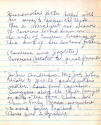 |
| M80.4.3 |
Notebooks |
7 |
Mrs. C father knew Mrs. John Erskine and the two boys from
after she had apparently died and had come to life.
Her grandfather Luke one of John Erskine's elders.Transportation,
beginning in April, 1932
3 trips to West Buncombe
$7.00
2 [trips to] Woodfin
$1.30
Trip to Marshall
$1.00
[Trip to] Mars Hill
$2.00
[Trip to] Canton (witnesses)
$2.50
transportation for summer school $6.00
Other trips to Asheville
$2.00
Total to Sept. 6, 1932
$21.80
Total used looking for work $11.30 |
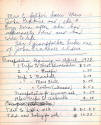 |
| M80.4.3 |
Notebooks |
7 |
"Where the Money Goes"
1932
Sept. 6, stamps for newspaper articles 0.90
Sept. 7, [stamps for] letters .12
interest (balance on note W.C.T.C.) 1.30
Insurance on C's house, park payment 2.00
[Insurance on] L's [house, park payment] 1.00
payment
at Johnson's 5.00
trip to
Weaverville .50
Sept. 8, fire clay for stoves .25
paid to
Mr. Williams for work .25
Sept. 9, stamps on letters sent .26
shoe
heels mended .10
long
distance (Sylvia) .60
gasoline .24
for
mending shoes .85
Sept. 12, stamps .18
Sept. 14, [stamps] .39
Sept. 15, [stamps] .15 |
 |
| M80.4.3 |
Notebooks |
7 |
Notes from Mooney
Cherokee myths may be roughly classed into
Animal stories
Local legends
Historical traditions
Story no. 5
The Daughter of the Sun
Earth people (grandchildren of the sun). Sun said "My grandchildren are
ugly; they grin all over their faces when they look at me." But the Moon
said "I like my younger brothers; I think they are very handsome" because
they always smiled pleasantly when they saw him in the sky at night- his
rays were milder. |
 |
| M80.4.3 |
Notebooks |
7 |
The Sun was jealous and planned to kill all the people so
every day when she got to her daughter's house she sent down such sultry
rays that there was a great fever. People died by hundreds. They went to the
Little Men for help, who said the only remedy was to kill the Sun. Made
medicine, changed two men to snakes, Spreading-Adder and Copperhead, sent
them to watch for Sun at her [daughter's] door. Went there, hid,
Spreading-adder about to spring- sun blinded him so he spit yellow slime, as
now when trying to bite. Copperhead crawled off, doing nothing after Sun
called [Spreading-Adder] a nasty thing.
People still died from heat sent to Little Men again. Changed one man to
Uktena, another |
 |
| M80.4.3 |
Notebooks |
7 |
to Rattle Snake. Uktena had very large horns in head. All
thought he'd do work but R. crawled near Sun daughter's door and when she
opened door to look for her mother he bit her and she fell dead in doorway.
He forgot to wait for the mother, but went back to earth. Uktena so very
angry, he went back too. "Since then we pray to the rattlesnake and don't
kill him because he is kind and never bites unless disturbed. Uktena grew
angrier and a so dangerous that one look from him killed people, so they
sent him up to Galûñ'lati, and he is there now.
When Sun found daughter dead, she went into house and grieved |
 |
| M80.4.3 |
Notebooks |
7 |
and people didn't die any more but now world was dark all
the time because the sun would not come out. Went again, to Little Men,
where said must bring back Sun's daughter if she was to come out again.
Daughter in Tsûsginâ'i, the Ghost country in Us'ûñhi'yi, the Darkening land
of the west. They chose seven men to go, each with a sourwood rod, a hand
breadth in length. L.M. told them that they must take box along, and when
they reached Tsûsginâ'i they would find all the ghosts at a dance. They must
stand outside of dance circle and strike young woman with rods and she would
fall to the g round. Then they must |
 |
| M80.4.3 |
Notebooks |
7 |
Put her in box and bring her back to her [mother]. but must
be very sure not to open box, even a very little way, till got home.
Took rods, traveled west seven days, came to Darkening land. Many people
there, having dance as in settlements. As she came around on outside circle,
1 struck her with his rod and she turned and saw him. As she came around 2
more times, another touched her with his rod, and on until as the last
touched her she fell out of the ring, and they put her in the box and closed
lid fast. The other ghosts did not seem to notice what had happened.
Started back. Girl came to life and begged to be let out. Refused. Said
hungry, then thirsty, then smothering to death |
 |
| M80.4.3 |
Notebooks |
7 |
fearing she was, opened box a very little way. Out flew a
redbird, "Kwish! Kwish! Kwish!" in the brushes. Shut lid went on to
settlement. Opened box- empty.
Sun wept till a flood occurred from her tears.
"My daughter! My daughter!"
Fearing they would be drowned, people got handsomest young men and women
to amuse her by dancing before her. Danced and sang best songs, but for a
long time, she kept face covered, paying no attention, |
 |
| M80.4.3 |
Notebooks |
7 |
until at last drummer changed tune- looked up, smiled,
forgot grief.
($9.60 a week, Mr. Penland makes now. $12 is full time work. Working 4
days a week now.) |
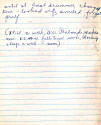 |
| M80.4.3 |
Notebooks |
7 |
Sequoia, "The Cadmus of the Cherokee"
(Cadmus- Myth. Son of Agenor, King of Siden. Settled in Beotia and founded
Thebes; brought the old Phoenician alphabet of 16 letters to Greece)
[Sequoia did much more than Cadmus did. S. originated a perfect Syllabary]
Sikua yi (Sequoia), known among whites as George Gist, or less correctly,
Guest or Guess. Much uncertainty as to parentage and early life as is much in the
case of Indian biography. Authorities generally agree that his father was a
white man, who drifted into the Cherokee nation same time before the
Revolution and formed a temporary alliance with a Cherokee girl of mixed
blood, who thus became the mother of a future teacher. |
 |
| M80.4.3 |
Notebooks |
7 |
A writer in the Cherokee Phoenix in 1828, ("G.C."),
(reprinted in Christian Advocate and Journal, New York, Sept, 26, 1828,)
says that only his paternal grandfather was a white man. McKenny and Hall
say that his father was a white man named Gist (McKenny and Hall Indian
Tribes, I. p. 35, et passim, 1858) Phillips asserts that his father was
George Gist, an unlicensed German trader from Georgia who came into the
Cherokee nation in 1786, (Phillips, Sequoia, in Harper's Magazine , pp. 542-
548, September 1870.)
By a Kentucky family it is claimed that Sequoia's father was dark. Gist... |
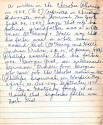 |
| M80.4.3 |
Notebooks |
7 |
Story of the Penlands
Ed Penland, 45 years old, lives at Porter's Cove- works at Beacon
Manufacturing Plant- married 1916- born 1888.
At age of 28, married Chloe Morgan, who was 23.
Son of Henry Penland and his wife Neil (Jones) Penland
Ed Penland was born at Bent Creek, Buncombe County. Moved up into a mountain
Cove- "Uncle Billy Candler Cove"- about five miles from Candler school.
Lived there till 18 or 19 years of age. Went himself to Haywood, when
Champion Fiber Co. first opened up. Stayed there till 1923. Worked at
different things, almost all over
|
 |
| M80.4.3 |
Notebooks |
7 |
the plant. Last five years worked in bleach department.
First years worked at about $1 a day for 7 days a week. The last 5 years
averaged $4 a day for 7 days a week. Part of last year there made $40 a week
regularly. When strike was called in 1924 or 1923, stayed on several days
after strike began, then came out and joined the union but didn't have much
to do with strikers. A man came to him after he had come to work at
Swannanoa and said he was sent to ask Penland to go back to work at Champion
Fiber Co. Said that he had been sent for by C.F.Co. three times. Did |
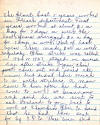 |
| M80.4.3 |
Notebooks |
7 |
not return. but stayed on at Beacon Manu. Co. at Swannanoa.
Made good money at Canton during War times. Saved $1000 in nine months.
Bought a place 1 mile east of Canton, with four years in which to pay for
it- paid that $1000 in 9 months- just after war. Sold it after came to
Swannanoa for $1500. Spent this mostly in expenses for sickness of wife and
children. Still owes Dr. Cutcher $59 [Here we stopped and discussed the need
of health insurance-"say 50 cts a month." Mentioned the Relief Association
which used to be at Canton when the relief _ and wood yard were torn up and sold, |
 |
| M80.4.3 |
Notebooks |
7 |
his share from store was over a hundred and fifty dollars
for his share-had been paying $2.50 maximum allowed a month. Lost in
sickness all he ever saved, and bought and kept up cars, Says he didn't
actually need cars until he bought the one he owns now to go to and from
work when his family was living near Pisgah.
Parents never owned a home-rented land and farmed. Health of family good- 5
boys and two girls in family. All living except for one boy who died a baby,
and the father who died 1932, in the fall. Hurt leg getting wood. Never
healed. Was 83 years old. Died perhaps of old age. |
 |
| M80.4.3 |
Notebooks |
7 |
Mother still living at homes of children, usually with her
son Robert Penland in Asheville. Read the Bible every night to children.
Could not write. About 75 years old. Mrs. Penland's History
Parents Lenore Morgan and Davis (Warren) Morgan. Own their home of 42 acres
and 2- room framed house, which was built by Daniel Davis, Mrs. Warren's
grandfather on her mother's side. Jim Swanger Warren, Mrs. Penland's
grandfather was once well-to-do, or rather his wife was, having inherited
much from her own father, Daniel Davis. Mrs. P's father and mother, the
Morgans, are fairly well |
 |
| M80.4.3 |
Notebooks |
7 |
educated- can read and write and carry on their business.
The grandfather Warren could read and write, but Mrs. Warren could not.
The Morgan grandparents, Mr. and Mrs. John Morgan, owned their own home and
small farm.
Mrs. Penland can read and write- is about in 5th grade. |
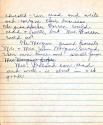 |
| M80.4.3 |
Notebooks |
7 |
Mooney, Page 401
When Babies are Born- The Wren and the Cricket.The little wren is the
messenger of the birds- pries into everything. Rises early, carries news to
bird council after visiting every house in the settlement. Reports on
new-born babies whether girl or boy. If boy, birds say, "Alas! The whistle
of the arrow. My shins will burn," knowing he will, when older, hunt them
with blow-gun and arrows. Glad if baby is a girl-"Thanks! The sound of the
pestle! At her home I shall surely be able to scratch where she sweeps."
The Cricket says, "Thanks!" I shall sing in the house were she lives." But
if it is a boy the cricket laments "She-he! He will shoot me, he will shoot
me, he will shoot me!" (Boys make |
 |
| M80.4.3 |
Notebooks |
7 |
little bows to shoot crickets and grasshoppers.) When
inquiring as to sex of new baby, the Cherokee asks, "Is it bow or a (meal)
sifter?" or, "Is it ballsticks or bread?" |
 |
| M80.4.3 |
Notebooks |
7 |
State of North Carolina
County of Buncombe
This Indenture made this the 9th day of January A.D. 1925- by and between
Mrs. EF. Ellis, party of the first part and Miss Charlotte Young, party of
the second part, To witnesseth:
That the said party of the first part for and in consideration of the sum of
Ten Dollars to her in hand paid by the said party of the second part, the
receipt whereof is hereby acknowledged has given, granted, bargained, sold,
conveyed and conformed and by these presents does give, grant, bargain, |
 |
| M80.4.3 |
Notebooks |
7 |
sell, convey, and conform,
Description taken from Recorded Deed in Court House |
 |
| M80.4.3 |
Notebooks |
7 |
property North 5 deg. 15 min. East 50.0 ft to a stake in the
said East line of the Government property, and at a point South 5 deg. 15
min. West 58.6 ft from the Northwest corner of Lot #41 of the above
mentioned plot; thence South 84 deg. 45 min East 160.0 Ft to a stake; thence
South 5 deg 15 min. West 50.0 ft. to a stake at the Northwest corner of lot
#6 of the said plot; Thence with the north line of the said lot #6 North 84
deg. 45 min. West 160.0 ft. to the beginning. Being lot #5 of a plot on the
Ellis subdivision of the 1/2 acre tract conveyed to the party of the first
part by Vernon |
 |
| M80.4.3 |
Notebooks |
7 |
Hemphill as made by Grady Owens, Civil Engineer, in the
month of August 1923 A.D.
It is hereby agreed by the parties herein and made a part of this conveyance
that the parties or party of the second part, their heirs or assigns, shall
not construct or allow to be constructed upon the above described lot, where
shall be within forty feet of the property line of the United States
Government. |
 |
| M80.4.3 |
Notebooks |
7 |
L Young's Deed
10th day of September
A.D. 1923
Mrs. E.T. Ellis and Mrs. Leona Young
Beginning at a stake in the East line of U.S. Gov. Oteen property, at a plot
N. 5 degrees 15' E, 50.0 ft from NW Corner of the 1/2 acre left #.3 as shown
on a plot of V. Hemp. Subdiv., as made by . . . . at at the N.W. Corner of
lot #7 of a map hereafter referred to, and runs thence with the E' line of
the side, Gov. prop. N. 5 deg. 15' E. 50.0 point to a stake in the south E.
line of the said Gov. prop, and |
 |
| M80.4.3 |
Notebooks |
7 |
at the SW. corner of lot #5 of the last mentioned map above,
thence with the S. boundary line of said lot #5 S 84 degrees 45' East 160.0
ft. to a stake at the Southeast corner of said lot #5 and in the East line
of the Hemphill property; thence to the side E. line of the Hemphill
property. S. 5 degrees 15'- 50.0 feet to a stake at the Northeast corner of
the said lot #7, N. 84 degrees 45' West 160.0 feet to the beginning. Being
lot #6 of the Ellis subdivision of the 1/2 acre lot #4 of the V. H.
subdivision as conveyed to the party of the 1st part by [Vernon Hemphill]. |
 |
| M80.4.3 |
Notebooks |
7 |
Deeds to Property 297- 4- C.Y.
274-193-L.Y.
|
 |
| M80.4.3 |
Notebooks |
8 |
Notebook of class notes taken by Charlotte Young [1 item] |
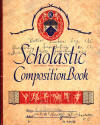

|
| M80.4.3 |
Notebooks |
8 |
Story of a man hunting especially for bear in fall
Man with bow and arrow went out, shot bear, which carried arrow in body.
Bear went to bear doctor. Hunter followed to where bear went to bear doctors
four white bears. Man and bear went on to king of bears. King commanded
bears to go to their homes. Lined bears up two by two. Hunter was paired
with bear he had wounded. Man's people went out looking for him with dogs.
Bear knew this would happen within four days. During these four days, each
day bear would repeat that within four days, 3, 2, 1, then today "something
will come and get him." Bear was teaching man poetry and chants to use in
hunting. Said, "I'll sit in front and they will get me and kill me. You
gather up scraps of claws, skin, |
 |
| M80.4.3 |
Notebooks |
8 |
and hair but don't speak to your people for seven days."
Looked to see if another bear in there.
Bear said "You look back as you are leaving to where you have gathered up
the scraps." Did so and found bear standing there. Man broke his promise,
spoke before seven days up. Was punished by having hair grow on face (origin
of beard). Then hunter died for breaking promise also. Also, that is the
reason a bear has seven lives, so hard to kill.("White man afraid to look
like a bear, so shaven twice a week," said Ute Jumper, who told this tale
August 24, 1933 at his home near Snow Bird Mountain.) |
 |
| M80.4.3 |
Notebooks |
8 |
4 directions in which the hunter calls- a king in each
direction
[Pronunciations and descriptions of four calls] |
 |
| M80.4.3 |
Notebooks |
8 |
The bear teaches the hunter to sing this the night before he
goes hunting. Sings song then washes, goes on and meets bear.
This song tells the name of the feeding place of the bears. It (bear) comes
at the mention of it.
Ute Jumper says he has used this song and succeeded in catching bears. |
 |
| M80.4.3 |
Notebooks |
8 |
This song when sung by a hunter makes him invisible to the
wild animals and to his enemies who might be searching for him. (Bear
taught this to the hunter, these old-time words, which the younger
generation don't speak)
The king of the bears, from his home in one of these places, hears the
weeping voice of the hungry hunter, and sends forth a bear to be killed. |
 |
| M80.4.3 |
Notebooks |
8 |
Story Once after fishing by river in winter, the iceberg,
all along the river. Bear came and asked otter how he caught fish in winter.
Otter tells bear to make a hole in ice and put his tail down their and wait
patiently till fish bit. Otter watched. Bear called, as ice froze, that fish
were biting. Otter said, "wait patiently." Waited till ice froze. Otter
called to him to jerk loose. Bear pulled quickly and broke tail off. |
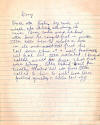 |
| M80.4.3 |
Notebooks |
8 |
In the Beginning of All Animals
Once upon a time a baby was born, father unknown. Mother raised up baby old
enough to be sent alone, mother sent him out to see his father. Bag full of
sores. She sent him for purpose of having sores cured. He went westward to
visit father. She probably told him where to find father. Finally came to
house of his father, who was the thunder. When boy went to father, said;
"I've come to get you to doctor my sores." Father hardly would recognize
son. Said remembered going to see a woman at some time. Went gathered herbs,
got pots and put herbs on to boil. After boiling for time, father picked up
son and threw him into pot. Then took pot out near house near a sycamore
tree, threw contents of pot out into river (pot, boy, and all). |
 |
| M80.4.3 |
Notebooks |
8 |
Left pot with boy in it in fiver all night. In morning,
Thunder sends out his own son to see if he could see strange boy who had
been in pot. Found him in sycamore tree sound and well. When boy who was
sent saw other boy, he was frightened, ran back and told father that
something strange was in tree. When father heard this, he went to see boy,
recognizing as his son, and called him back to his house. Both went in.
Father got box from under bed to give gifts to little son who had come. In
box was rattle snakes. Took them out, one by one, trying one snake on each
joint of boy. Then took boy out to locust trees in yard, told him to go and
play, but to play with only seven locust trees. Boy stood astonished,
waiting. When father said now, then it lightened. It lightened eight times,
bursting eight trees. Father then invited boy in to eat |
 |
| M80.4.3 |
Notebooks |
8 |
Feasted with father, who told him he could return to mother.
After going back, grew up to be a wise man. had sons, 2, of his own. Had
been told by his father how to hunt wild meat. When wife was out of meat, he
went out hunting, bringing in anything he wished. Never failed. While sons
were growing up, made them bows and arrows when they said they could hunt.
Boys decided to follow father and find how he could get anything he wanted.
Nearly out of rations, father went out, the boys decided one to remain, the
other follow father, who was not to know of it! Father going through gaps and
valleys, pass seven gaps and seven valleys, came to a cave almost like
house. Opens door, walks in, gets animal- deer! Brought it out, boy hid
from him, but had seen him- |
 |
| M80.4.3 |
Notebooks |
8 |
Time were needy, boy loved father, he and brother could go
out to get meat. Father consented. Boys started different directions from
where father started, but went to cave, opened door- all animals ran out.
boys so frightened, they became unconscious. Heard animals loose, roared
like thunder. Father shut up what few were left. Told boys it would be hard
after this to get wild meat. Everything came out- mosquitoes, lice, ants,
fleas, stinging things.
Father taught boys to hum a song
Ka-nah-den, son of
Yun-dir-guel-aw-sken
(What herbs were in the pot?
What is the significance of sycamore
tree and of the seven locust trees?)
Oo-sta-nah-lee, near Severville, Tenn.
This name is still used as the name of a gap near Severville
Muh-tee, name of old time pottery,
The younger generations now call Gah-de-guat-leen |
 |
| M80.4.3 |
Notebooks |
8 |
Bear Came From Humans
The bear is the off-spring of a human being and ground-hog.
Then in the story of the bear, teaching the man to hunt, the bear does so
because he is kin of the bear. It is a female bear, and she takes it as a
kindness that the man mates with her.
The Thunder Story should precede the story of the hunter learning from the
bear how to call them to him.
In the care of the thunder story, not only animals and distressing insects
itch, and all sorts of diseases.
The bear inherited his long tail from the ground-hog but lost it by the
trick of the otter in the hole in the ice.
|
 |
| M80.4.3 |
Notebooks |
8 |
The elder generations were obedient to the laws laid down
for hunters.
In those days, all baby boys were bathed in herb tea (probably the same brew
which Thunder used for his son), the baby's first bath, given by its
parents. No one else allowed to see it who were not in the house when it was
born. This bath, taken every day for four days, made the boy a good hunter.
The good hunter never touched a woman while she was menstruating or while
pregnant. He was true to his mate at all times, entirely self-controlled.
The women were obedient to the hunters' laws. They never cooked food while
menstruating; they had a special clean chair to sit on, which stayed in the
corner of the room when not in use by some woman in the family. Each woman
had her individual plate to use at her menstrual periods; this plate was put
carefully away the rest of the time. She was given seven days of such
isolation, four for menstruation and three afterwards. The old time families
were small, usually not more than four children to the family. Ollie
Nahyaneeta says "the men had respect for the women." |
 |
| M80.4.3 |
Notebooks |
8 |
Words
[Cherokee words for "a boy full of sores," "raven," "pottery," "in the
water," and "a boy nearly grown"] |
 |
| M80.4.3 |
Notebooks |
8 |
Sometimes babies were named for the wild animal
which father killed at the time of birth. As, "climbing squirrel," "running
squirrel," "standing wolf," etc. Or whatever happened at that particular
hour.
If hunter good enough to kill animal whose meat expectant mother craved, he
won the title "Ka-nah-di."
"Feather-in-the-Water" (Oo-gee-dat-lee Ah-whoo-yen) for instance, named
baby's father for his great grandfather, who, when unsuccessful in hunting,
would bring feathers to his wife and claim he had killed game and lost it,
and he brought feathers to prove it. He knew where there were some turkey
feathers where he had killed one long ago.
Allie's grandmother learned this story from young Feather-in-the-Water. |
 |
| M80.4.3 |
Notebooks |
8 |
Fable of the Rabbit
In the beginning, the rabbit was in America- the trickiest of animals. Used
human language. The first one he met was the otter, which was going along
the riverside.
"What do you eat?" asked rabbit.
"Crabs, fish, crawfish. What do you eat?"
"The same," said rabbit. Decided on a trick to prove what each did eat.
"Suppose," said rabbit, "we sit here on the river side and see who eats
fish. We'll both keep our eyes shut."
Otter did as he was told. Rabbit didn't. He exchanged foods. "No we'll get
up and see who eats fish."
(Rabbit lives in winter on berries, dry sticks, and whatever he can find.)
After episode, he walks along and meets another animal. Pretended always to
be king- would borrow clothes from the king |
 |
| M80.4.3 |
Notebooks |
8 |
The king was sometimes one and sometimes another. Rabbit
would dress up and give rules and laws. The one he met second time was a
bear. He went as visitor to bear's home, who invites r. to eat dinner and
cooks peas for dinner. Rabbit was watching what he was cooking and how. Bear
sets pot off on hearth, get a knife, cut himself down the breast to get
grease to season.
Then r. asks bear to come to see him day after tomorrow. Two days later,
bear went to rabbit's house. Rabbit says, "Just wait a little while. I just
now put the pea on."
When peas done, rabbit sets pot off, gets knife, cuts himself, blood came.
Rabbit brought blood, fainted, tumbled over. Bear came in and said
"You have hurt yourself. You should not have done that."
Then he gets knife, cuts his own breast, seasons peas.
Rabbit again goes on a trip [do-wish-ka-lain (flint) mun-yun (rock)]. |
 |
| M80.4.3 |
Notebooks |
8 |
III.
The flint rock was like a human- had life
Rabbit met up with flint rock.
Night came on. They stopped to stay all night. When ready to lie down,
Rabbit had a wooden spade (or shovel) Used this for his pillow, said he must
always have a pillow. Rabbit told flint rock something always happened to
those staying all night there.
He was waiting for flint rock to go to sleep. When f. was sleeping tight, r.
thought of a trick; took up fire from campfire in spade and then threw it on
flint rock. Scared, went and hid behind a tree. Sparks flew, flint sparkled
and sent off bits of fiery flint. One piece flew to rabbit, who was sitting
behind a tree laughing and hit him on the nose, cutting it down and cutting
his upper lips, which explains why rabbit has such a nose and lip. |
 |
| M80.4.3 |
Notebooks |
8 |
IV. Why Rabbit so mean
R. buried close to spring. A meeting going on near spring. People drink from
it. R. goes before they go and muddies water. Tracked him, found who it was.
These people told the deacon about. He was told to get resin and shape it
like a baby and put it beside spring. While baby stayed there, all got clear
water.
At last R. gets up courage to go to the resin baby and tell it to move. Baby
gave no answer.
Hit it with fist, which stuck to fist.
"Turn me loose or I'll hit with other paw." Does so, sticks.
"Turn me loose or I'll kick you over."
Kicks, sticks. Same for all four feet.
King finds R. Takes him to meeting, all call counsel. Decide to send him
across the water. Would have remained in America if he hadn't been so mean. |
 |
| M80.4.3 |
Notebooks |
8 |
[Cherokees use resin in soap along with meat craps and ash]
5. The Rabbit and the DeerLucy Swimmer- Lu-ci-mi-Ah-yeh-ee-mee
Mrs. Ute Jumper
Mr. " "
Allie Wayaneeta |
 |
| M80.4.3 |
Notebooks |
8 |
Deer Song
Like Bear Song except
Deer, Ah ha weeñ |
 |
| M80.4.3 |
Notebooks |
8 |
Rabbit and the Deer
*R. walking along road one day, met a deer. Talk. R, thinks of a trick. Has
a place where he runs races. Has already cut briars loose. Deer didn't know
that this was done. R. told deer they would run race thru briars, easily
done by him, that as he ran thru briars, he cut them loose with his paw.
Deer told rabbit to go first. Runs through where he had cut briars. When he
stopped, he came and told deer to try. Deer foolish enough to try running
swiftly thru briars. Jaws caught in briars, his pretty teeth (like
dog's) broken and ruined in the upper jaw. Hence deer has no upper teeth.
*Deer, proud of his beautiful teeth, annoyed rabbit, who planned to play a
trick on deer
|
 |
| M80.4.3 |
Notebooks |
8 |
Notes from Ethnology Bureau Report
1898- Mooney's Myths of the Cherokees
(Taken from this copy of the book which is among the possessions of the late
Horace Kephart, Bryson City- Aug. 30, 1933, Kindness of Jack Coburn,
Administrator)The History of the Cherokee as known to the white man,
begins with De Soto's passing through their country in May, 180, as he
advanced up the Savannah River in fruitless search for gold.
At Cofitachiqui, an important Indian town on the lower Savannah, governed by
a "queen," Spaniards found hatchets and other objects made of copper, some
of which was of fine color and appeared to be mined with gold though they
had no means of testing it: Were told the metal came from an interior
province called Chisca, a country thinly settled and impassable for
horses...
The outrageous conduct of the Spaniards so angered the Indian-queen that she
now refused to furnish |
 |
| M80.4.3 |
Notebooks |
8 |
guides and carriers (on an expedition to Coca, a rich and
plentiful province to the north, its capital, Chioha. Living, as the natives
said, twelve days' travel inland.), whereupon the De Soto made her a
prisoner, with the design of compelling her to act as a guide herself, at
the same time using her as a hostage to command the obedience of her
subjects. She led them far out of their course and managed to escape,
leaving them to make their way as best they could across the mountains.
Departing from Cofitachiqui, they turned first toward the north, passing
through several towns subject to the queen, to whom, although a prisoner,
the Indians showed great respect and obedience, furnishing whatever
assistance the Spaniards compelled her to demand for their purposes. In a
few days they came to a "province" called Chalaque," probably upon the
waters of the Keowee River: the eastern head-stream of the Savannah. It is
described as the poorest country for corn |
 |
| M80.4.3 |
Notebooks |
8 |
that they had yet seen, the inhabitance subsisting on wild
roots and herbs and on game which they killed with bows and arrows.
They were naked, lean, and unwarlike. The country abounded in wild turkeys
("Gatinas") which they people gave very freely to strangers, one town
presenting them with seven hundred. A chief also gave two deerskins and a
great present. Garcilaso, writing on the authority of an old soldier nearly
50 years later, says that the "Chalaques" deserted their towns at the
approach of the white men and fled to the mountains, leaving behind only old
men and women and some who were nearly blind. Although it was too early for
the new crop, the poverty of the people may have been more apparent than
real, due to their unwillingness to give any part of their stored up
provisions to the unwelcome strangers. Needing corn for selves and horses,
they hurried away.
In a few days they arrived at Guaquili, probably a small town, where they
were welcomed in a friendly manner. |
 |
| M80.4.3 |
Notebooks |
8 |
The Indians giving them corn and wild turkeys and dogs of
small species, bred for eating purposes, which did not bark. Also were
supplied with men to help carry the baggage. The name Guaquili has a
Cherokee sound and may be connected with 'wa'guli,' "whippoorwill," 'wagi li,'
"foam," or gili, "dog."
Traveling still toward the north, they arrived a day or two later in the
province of Xuala in, which we recognize the territory of the Suwali, Sara,
or Cheraw Indians, in the Piedmont region, about the head of Broad River in
N.C., Ruled by the queen of Cofitachiqui, though a separate province
[Rutherford County now?].
From here they turned westward, crossing a very high mountain range which
appears to have been the Blue Ridge, descending on the other side to
probably one of the tributaries of the French Broad. Cold, though late in
May. After several days, about the end of May, came to town of Guasila, or
Guaxule. Cheif and principal men |
 |
| M80.4.3 |
Notebooks |
8 |
came out some distance to welcome them, dressed in fine
robes of skins, with feather head-dresses, after the fashion of the country.
Before reaching this point, the queen had managed to escape together with
three slaves of the Spaniards, and the last that was heard of her was that
she was on her way back to her own country with one of the runaways as her
husband. What grieved De Soto most in the matter was that she took with her
a small box of pearls, which he had intended to take from her before
releasing her, but had left with her in order "not to discomfort her
altogether." (Quoted from Elvas, Hakluyt Society, IX, p. 61, 1851.)
Guaxule is a name used by De Soto's army as a synonym of good fortune, so
kind and hospitable were the natives of this place. Among other gifts were
300 dogs for food, although, according to the Elvas narrative, the Indians
did not eat them.
Principal officers of De Soto were lodged in the "chief's house," the
townhouse on a hill, which seems to |
 |
| M80.4.3 |
Notebooks |
8 |
have been the great Nacoochee mound in White county,
Georgia, a few miles [northwest] of the present town of Clarksville. (Garcilaso,
La Florida del Inca, p.139, 1723)
Proceeded down the river, to which was probably the Chatahoochee, and in two
days reached Canasoga, or Canasagua, a frontier town of the Cherokee. As
they neared the town, were met by Indians, bearing baskets of "mulberries"-
probably service berries.
From Xuala (southeast of present Asheville at foot of Blue Ridge) they
followed along the mountains to Tocux (Toxaway?) Cauchi (Nacouchee?) and
Tanasqui- apparently Cherokee towns, although the forms can not be
identified, and after resting 3 days at the last named place went on "to
Solameca, otherwise called Chiaha."
A gap of a hundred years occurs now. It seems that the Spaniards from
St. Aug. and St. Elena sent expeditions meantime often to explore the
Cherokee country for gold and copper. Numerous traces of ancient mining
operations, with remains of old |
 |
| M80.4.3 |
Notebooks |
8 |
shafts and fortifications, evidently of European origin,
show that these discoveries were followed up, though Spanish policy
concealed this fact from the world. |
 |
| M80.4.3 |
Notebooks |
8 |
The Mother Bear's Song
(From Mooney)
A hunter in the woods one day heard singing in a cave. He came near and
peeped in, and it was a mother bear singing to her cubs and telling them
what to do when the hunters came after them.
Said the mother bear to her cubs, When you hear the hunters coming down the
creek, then
Tsâ'gï, tsâ'gï, hwï'laï'
Tsâ'gï, tsâ'gï, hwï'laï'
Upstream, upstream you (must) go
Upstream, upstream, you (must) go
But if you hear them coming up the creek, children, then-
Geli, geli, hwï'laï'
Geli, geli, hwï'laï'
Downstream, downstream, you (must) go
Downstream, downstream, you (must go)Another hunter out in the woods one
day thought he heard a woman singing to her baby. He followed |
 |
| M80.4.3 |
Notebooks |
8 |
the sound up to the head of the branch until he
came to a cave under the bushes, and inside was a mother bear rocking her
cub in her paws and singing to it this baby song, which the Ani'-Tsâ'gûhi
used to know before they were turned into bears:
Ha'-mama' (repeated four times);
Udâ'hale'yï hi'lûñnû, hi'lûñnû;
Udâ'hale'yï hi'lûñnû, hi'lûñnû;
Let me carry you on my back (4 times);
On the sunny side go to sleep, go to sleep;
On the sunny side go to sleep, go to sleep.Baby Song to Please the
Children
Ha'wiye'-hyuwe', Ha'wiye'-hyuwe',
Yu'wê-yuwëhe', Ha'wiyëhyu'-uwe'-
Yâ'nû une'guhi' tsana'sehâ';
E`ti uneguhi' tsana'sehâ;
Yâ'nû nudûñnetû' tsa'nadiskâ
(First two lines sung as in Cherokee)
The bear is very bad, so they say;
Long time ago he was very bad so they say;
The bear did so and so, they say. |
 |
| M80.4.3 |
Notebooks |
8 |
The Indians of older time had many songs intended to call up
the deer and the bear. Most of these have perished but a few are still
remembered, they are sung by the hunter, with some accompanying ceremony, to
a sweetly plaintive tune, either before starting out or on reaching the
hunting ground. One Cherokee sang, sung with repetition, may be freely
rendered:
O Deer, you stand close to the tree,
You sweeten your saliva with acorns
Now you are standing near
You have come where your food
rests on the ground.
Gatschet, in his Creek Migration Legend (I, p. 79) gives the following
translation of a Hichitee deer hunting song:
Somewhere the deer lies on the ground, I think;
I walk about.
Awake, arise, stand up!
It attempts to rise, I believe; I walk about.
Awake, arise, stand up!
Slowly it raises its body, I think; I walk about.
|
 |
| M80.4.3 |
Notebooks |
8 |
Awake, arise, stand up!
It has risen on its feet, I presume; I walk about.
Awake, arise, stand up!
From Mooney, (P. 472- 473)
Tsistu'yi,
Kuwâ'hi
Gâte'guâ(hi):
Are four mountains, under each of which the bears have a townhouse in which
they have a dance before returning to their dens for their winter sleep. At
Tsisstu'hi, "Rabbit Place," known to us a Gregory Bald in the Great Smokies
dwells the Great Rabbit, chief of the Rabbit tribe at Kuwâhi, "Mulberry
Place," farther northeast along the same range, resides the White Bear,
chief of the bear tribe, and near by is the enchanted lake of Atagâ'hi, to
which the wounded bears go to bathe and be cured.
In Cherokee mythology as in that of Indian tribes generally, there is no
essential difference between men and animals. In the primal genesis period
they seem to be completely undifferentiated, and we find all creatures alike
living and working together in Harmony and mutual helpfulness, until man, by
his aggressiveness and disregard for he rights of others, provokes their
hostility, when insects, birds, fishes |
 |
| M80.4.3 |
Notebooks |
8 |
reptiles and four-footed beasts join forces against him.
Henceforth their lives are apart, but the difference is always one of degree
only. The animals, like the people, are organized into tribes and have like
them- their chiefs, and townhouses, their councils and ballplays, and the
same hereafter in the Darkening land of Usuñ'hiyi. Man is still the
paramount power, and hunts and slaughter the others as his own necessities
compel, but is obliged to satisfy the animal tribes in every instance, very
much as a murder is compounded for, according to the Indian system, by
"covering the bones of the dead" with presents for the bereaved relatives.
This pardon of the hunter is made the easier through a peculiar doctrine of
re-incarnation according to which, as explained by the shamans there is
assigned to every animal a definite life term which can not be curtailed by
violent means. If it is killed before the expiration of that allotted time,
the death is only temporary, and the body is immediately |
 |
| M80.4.3 |
Notebooks |
8 |
resurrected in its proper shape from the blood drops, and
the animal continues its existence until the end of the predestined period
when the body is finally dissolved and the liberated spirit goes to join its
kindred shades in the Darkening land. This idea appears in the story of the
bear man and in the belief concerning the Little Deer. Death is thus but a
temporary accident and the killing a mere minor crime. By some priests it is
held that there are 7 successive re-incarnations before the final end.
Certain super natural beings, Kanati and Tsulkalu' have dominion over the
animals and are therefore regarded as the distinctive gods of the hunter.
Kanati at one time kept the game animals as well as the pestiferous insects
shut up in a cave underground from which they were released by his undutiful
sons.
Ball players forbidden to eat flesh of Rabbit, which often becomes confused
in running. |
 |
| M80.4.3 |
Notebooks |
8 |
Indians believe that the presence of a powerful talisman,
howsoever beneficent in itself, is innervating to those in its vicinity.
Hence such things are kept in a spherical tipi or hut built for the purpose-
as we are careful of high explosives
Wadâñ- thanksOrigin of Diseases and Medicine
In old times beasts, birds, fishes, insects, and plants could all talk, and
they and people lived together in peace and friendship. But as time went on,
the people increased and spread over the earth. Animals cramped for room.
Man made bows, arrows, knives, blowguns, spears, hooks for slaughter of
larger animals. Even frogs and worms trodden their carelessness or contempt.
Animals resolved to consult as to means of common safety.
Bears were first to meet at Kuwâhi mountain the "Mulberry place," Old White
Bear, the chief presiding. Some one asked how man killed them. "With bows
and arrows!" cried chorus of bears. These described. "Bow of wood, string of
our entrails." |
 |
| M80.4.3 |
Notebooks |
8 |
One bear gave his life to furnish strings of his entrails.
Bears too, used these and locust wood, made bows, but claws caught in string
and hindered. Suggestion made that they trim off claws. "Can't climb trees
if we do. One already has given life for strings. We'll all die of
starvation if we cut off our claws. Better trust to our teeth and claws than
to man's weapons," said chief.
Counsel dismissed. Had it been otherwise we might have had war with Bears,
but we kill bear without even asking his pardon.
The Deer next held a council, presided over y Little Deer. Decided to send
rheumatism to hunter unless he took care to ask pardon of victim for killing
him. Sent word to nearest human settlement of decision, also telling man
what to do when necessity forced him to kill one of the little Deer tribe.
Now, whenever a hunter shoots a Deer, the Little Deer, who is swift as the
wind and can not be wounded, runs quickly up to the spot, and, bending over
the blood stains, asks the spirit of the deer if it has heard the hunter's
prayer for pardon; if the reply be "yes," all is well, and the hunter goes
on his way; |
 |
| M80.4.3 |
Notebooks |
8 |
but if the reply be no, he follows the trail of the hunter,
guided by the blood drops on the ground, to cabin of hunters, enters
invisibly, strikes hunter with a rheumatism, so that he becomes at once a
helpless cripple.
Next came Fishes and Reptiles with their own complaints. Determined to give
hunter dreams of slimy folds of snakes coiling around him and blowing foul
breath in face or dream of eating raw or decaying fish so as to lose
appetite, sickens and dies. This explains dreams of snakes and fish.
Next Birds and Insects and smaller animals including Grub Worm. Seven votes
enough to condemn him. One by one made complaints. Frogs said sores and
roughness on his back caused by man kicking him around. Bird complain that
man "burns my feet" when he sizes and burns feathers and claws. Only Ground
Squirrel, too small to be harmed, had a good word for man, which caused
other animals to claw him (marks still to be seen on back).
Began to devise new diseases, and had they not given out on this |
 |
| M80.4.3 |
Notebooks |
8 |
man would have been exterminated. Grub Worm grew constantly
more pleased as name of each disease was mentioned and when someone
suggested that women should sometimes die of menstruation he said "Wadâñ!"
(Thanks!) "I'm glad some more of them will die for they are getting so thick
they tread one me" The thought fairly made him shake with joy, so that he
fell over backward and could not get on his feet again; but wriggled off on
his back, as he has done ever since.
When the Plants, who were friendly to man heard of all this, determined to
defeat evil design of others, and furnished remedy for every disease, even
weeds having medicinal use if man can find it. When doctor does not know
what plant to use for sick man, spirit of plant tells him. |
 |
| M80.4.3 |
Notebooks |
8 |
Nûñnihi- Immortals- spirits which live everywhere
See stories of Tsuive'mahi, Kanásta, Yahula, etc.Story of the Great Leech
of Tlanusi'yi
The spot where Valley Rivers joins Hiwasse, at Murphy, NC, is known to the
Cherokee as Tlanusi'ye, the Leech place. Just above the junction is a hole
in the Valley River, and above it a natural stone bridge; a ledge of rock
running across the river. From [south] side a high bank from which one could
look down into the water.
One day some men going along the trail there saw a great red object big as a
house, which lay on the rock ledge on the middle of the stream below them.
Unrolled, stretched itself out |
 |
| M80.4.3 |
Notebooks |
8 |
until it looked like a great leech, striped red and white.
Rolled up into a ball again, stretched itself again, at last crawled down
the rock and into stream below. Water began to boil a foam and a great
column of white spray was thrown into the air and came down like a
waterspout on spot where men were standing, would have swept them into
water, but ran for lives in time. More than one person was carried down so,
afterward found lying on bank without nose or ears. At last people feared to
go near bridge.
One young fellow dared. Painted face, dressed in buckskin, went out upon
bridge of rock singing
Tlanu'si gane'ga digi'gage
Dakwa'nitlaste'sti.
I'll tie red leech skins
On my leg for garters.But before he was half way across, the water began
to boil and swept him in and he was never seen again.
Just before the removal, 2 women went |
 |
| M80.4.3 |
Notebooks |
8 |
there to fish. One laid her child down and was preparing her
line. Barely rescued child from boiling, spouting water. Monster still
there, though never seen. Some day this deep hole connects river with
Nottely river not far from the mouth, an underground waterway.
Yuñur Tsundsi, the Little People are not Nunihi, but fairies, no larger than
children. |
 |
| |
|
|
Bill Jenkins, Jonas Jenkins
Bill with federals, Knoxville
Jonas, with Thomas
160 men going to make a raid on Thomas's house, Maj. Stringfield's, guided
by Jonas, laying for other. Jonas to shoot first man; Stringfield, the next
man. First man happened to be Bill. Jonas saw Bill at head of Federals and
said, "I can't shoot Bill. You shoot him and I'll get the next one." They
"swapped" but the captain missed Bill. Jonas shot the horse of "the next
man." This was a skirmish at Indian Gap, near Newfound Gap, which turned
Federals back.
Thomas's Legion built a road so that the artillery could be brought to that
gap. |
 |
| M80.4.3 |
Notebooks |
8 |
Weaver Marr, Head of Boy Scouts, Jacksonville, Florida, has
valuable Indian materials, says Mr. Jack Coburn.
"âtari" or "âtali," mountain
Xuela, the territory of the Sara Indians in the foothills of the Blue Ridge,
southeast of the present Asheville, NC.
Swannanoa, a corruption of Suwáli-nûñnâ(-hi)
[Diacritical Marks used by Mooney listed] |
 |